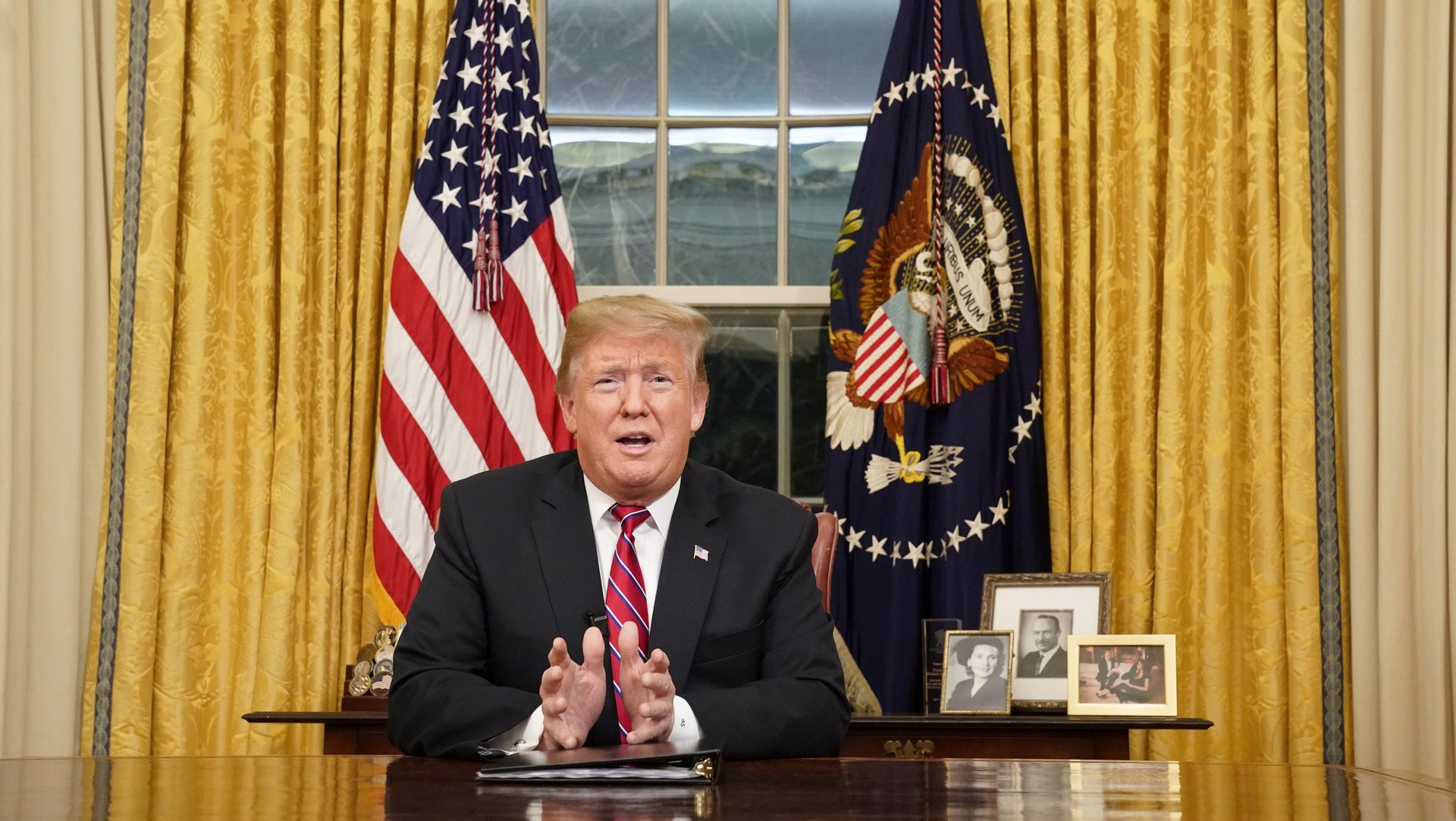Trump’s border wall speech changed nothing. Now what?
So what happens now?


So what happens now?
In typical Washington DC fashion, both sides are declaring victory after Donald Trump delivered his stilted, scripted speech from the Oval Office last night (Jan. 8).
He repeated his familiar scare scenarios about the southern border, including falsely claiming that a wall would stop the flow of heroin into America and that immigrants are a high crime risk. Democrat leaders Nancy Pelosi and Charles Schumer responded by calling him a fear-mongering bully who is staging a temper tantrum.
Television moments aside, nothing has changed for the 800,000 government workers who are furloughed or working without pay, and the millions more Americans affected by a federal government shutdown that’s days away from hitting an all-time record. As tales of unpaid bills and unexpected consequences pile up, pressure is mounting for Congress and the White House to come to an agreement to open the government again.
Here’s what will happen next.
Republicans will decide whether to abandon Trump
Trump meets with Senate Republicans today (Jan. 9) for a policy lunch.
The Republican-controlled Senate voted last month in favor of a spending bill to prevent the government from shutting down that didn’t include money for the border wall. But after Trump said he would refuse to sign it, Majority Leader Mitch McConnell backtracked, refusing to bring any spending bill to the floor that the president didn’t approve, a move that kicked off the shutdown Dec. 21.
Democrats, who now control the House, have shown no signs of backtracking on their pledge to give Trump nothing at all in the spending bill to build a physical wall on the border. In fact, Trump’s speech gave the party’s progressive wing the chance to double down on their criticism.
Senate Republicans, though, could push Trump to make a deal. They could even partner with Democrats and vote to override his veto of a spending bill, an option one veteran congressional aide said threatened to “implode” the party.
There’s already some evidence the Republicans are cracking on supporting the shutdown. “The operations of the Department of Interior and the National Park Service or the operations of the IRS and whether or not tax refunds go out don’t have anything to do with border security,” Alaska senator Lisa Murkowski told reporters before Trump’s speech. “Let’s bifurcate these issues,” she said.
Hours later, Schumer would make the exact same proposal after Trump’s speech.
The Republicans have 53 members in the Senate to the Democrats’ 47. For anything to change, the first thing that needs to happen is McConnell needs to allow a spending bill to come up for a vote. He delivered a lukewarm response to Trump’s speech, saying “his proposal to increase security through physical barriers suits the reality on the ground,” and that he hoped Democrats would “come to the table.” It was not quite the full-throated vehemence of his previous endorsements of Trump policies.
A crucial White House meeting
Trump also will meet with House and Senate leaders at the White House at 3pm today. Negotiations are expected to center on a way to end the impasse without Trump losing face. It’s unclear right whether Pelosi and Schumer will go in person or send aides as they have in the past.
Trump himself began the day with a plaintive-sounding tweet that seemed an appeal to Americans to recognize his achievements. While longtime Trump supporters like Sean Hannity were quick to praise his steadfastness after the speech, crucial deadlines loom. On Jan. 11, government workers will miss their first paycheck, and on Jan. 12 the shutdown would become the longest in US history. On Jan. 21, Trump is scheduled to go to the World Economic Forum in Davos with a contingent of cabinet members; they’ve already spent millions in taxpayer money on hotel bills.
Meanwhile, White House press secretary Sarah Sanders said this morning that declaring a national emergency is “something we’re still looking at” but that an agreement with Congress would be better.
What do the polls say?
A majority of Americans blame Trump for the shutdown, according to polls taken before the Oval Office speech. Republican strategists are closely watching for any new signs that the speech has changed minds.
They are increasingly worried about Trump’s re-election prospects in 2020, and some behind-the-scenes decision making on the shutdown could hinge on how supportive Americans are of a wall.